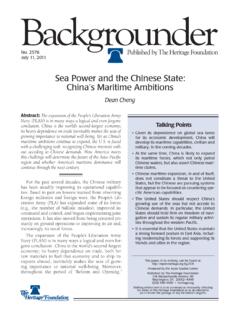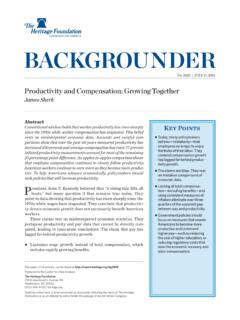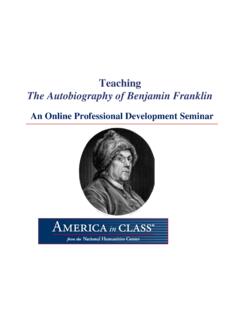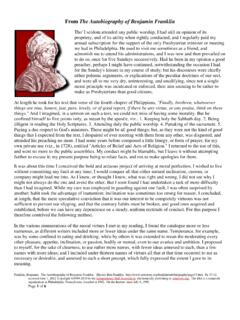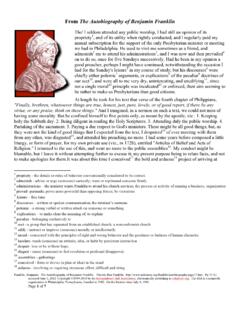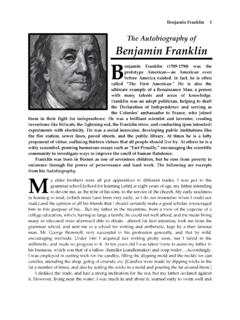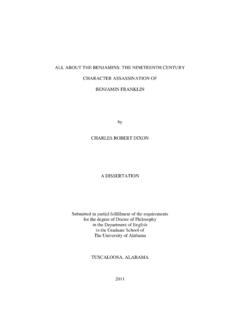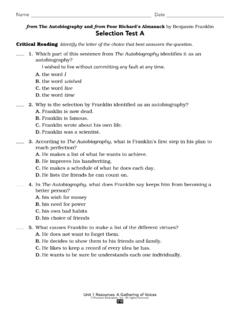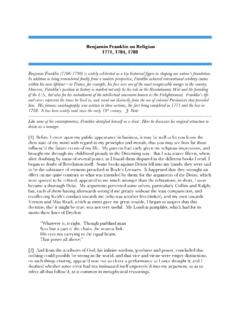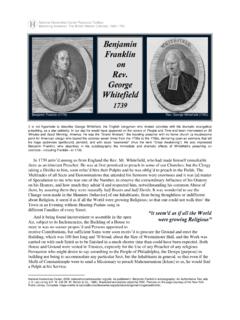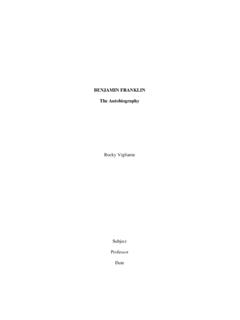Transcription of Benjamin Franklin: The Sage of America
1 FIRST PRINCIPLESFOUNDATIONAL CONCEPTS TO GUIDE POLITICS AND POLICYNO. 10 | July 8, 2013 There was a time, not too long ago, when every schoolchild in America learned about Benjamin franklin and his exploits; a great many read his brief Autobiography. unfortunately, that time has passed. None of the American Founders is the icon he once was, of course, but in the case of franklin , this is especially lamentable because franklin addressed himself more to the common man, and to the young, than did his colleagues. He directed his writing large-ly to the formation of popular character and had a very salutary effect on that character for as long as he was widely in Boston in 1706, franklin was older by a generation than most of his fellow Founders.
2 The youngest son of youngest sons for five generations back, as he tells us with pride, franklin necessar-ily made his own way in the world. He tried sev-eral trades before settling on printing, the one mechanical trade that suited his bookish and searching still very young, he read books of polemic Divinity, mostly attacks on Deism that he found in his father s library. These books had an effect quite contrary to what was intended by them, franklin tells us, and he became a thorough Deist by the time he was His unconventional religious beliefs, together with his fondness for disputing with his fel-low Bostonians, contributed to his eventual need to depart for only 16 and a printing apprentice to his brother James, he penned a series of essays under the pseudonym Silence Dogood, devoted to chiding the faults and encouraging the virtues of his fellow Bostonians.
3 It was a device he returned to again and again. In Philadelphia, he wrote as the Busy-Body, a self-proclaimed censor morum, and at other times as Alice Addertongue, Obadiah Plainman, Homespun, and of course Poor Richard, whose sententious prov-erbs (many gleaned from other sources) remain part of our heritage. franklin considered newspapers (as well as almanacs) to be another Means of communi-cating Instruction 2 to the wider public and filled his out with small, edifying pieces. It was part of a larger educational project, to which his Autobiography also s curiosity extended not only to poli-tics, morality, and theology, but also to science.
4 He investigated natural phenomena from weather pat-terns to the Gulf Stream to electricity. He founded This paper, in its entirety, can be found by the B. Kenneth Simon Center for Principles and PoliticsThe Heritage Foundation 214 Massachusetts Avenue, NE Washington, DC 20002 (202) 546-4400 | written here is to be construed as necessarily reflecting the views of The Heritage Foundation or as an attempt to aid or hinder the passage of any bill before OF AMERICAN POLITICAL THOUGHTB enjamin franklin : The Sage of AmericaSteven Forde2 MAKERS OF AMERICAN POLITICAL THOUGHT | NO. 10 July 8, 2013 Benjamin FranklinBornJanuary 17, 1706, in Boston, Massachusetts; son of Josiah franklin (tallow chandler and soap boiler who immigrated from England in 1683 to escape religious persecution) and Abiah Folger ( franklin ) of Attended one year of grammar school and briefly had a private tutor; apprenticed at father s tallow shop and later learned the printing trade; worked for his brother James s newspaper, the New-England Courant, in 1721 before moving to Philadelphia to open a print Presbyterian, but did not actively practice in adult At the age of 24, married Deborah Read on September 1, 1730.
5 They had three children: William franklin (1729 or 1730), Francis Folger franklin (1732), and Sarah Sally franklin (1743).Accomplishments Purchased the Pennsylvania Gazette (1729). Published Poor Richard s Almanack (1732 1758). Clerk of the Pennsylvania Assembly (1736 1751). Deputy Postmaster of Philadelphia (1737 1753). Invented the franklin stove (1741). Founded the American Philosophical Society (1743). Member, Pennsylvania Assembly (1751 1764). Founded what became the University of Pennsylvania (1751). Deputy Postmaster General for the colonies (1753 1774). Commissioner, Albany Congress (1754). Ag ent in England for Pennsylvania (1764 1775), Georgia (after 1768), New Jersey (after 1769), and Massachusetts (after 1770).
6 Delegate, Second Continental Congress (1775 1776). Postmaster General of the United States (1775 1776). Agent of the United States to France (1776 1785). President of the Executive Council of Pennsylvania (1785 1788). President, Pennsylvania Society for Promoting the Abolition of Slavery (1787 1790). Delegate, Constitutional Convention (1787).DiedApril 17, 1790, in Philadelphia, Pennsylvania, where he is buried at Christ Words A dying man can do nothing easy. 3 MAKERS OF AMERICAN POLITICAL THOUGHT | NO. 10 July 8, 2013the American Philosophical Society to advance the cause of science in the New World.
7 His research in electricity led to the discovery of the polarity of electrical current; his invention of the lightning rod and many other advances brought him interna-tional renown. He was admitted to the Royal Society of london and other European learned societies. franklin was the only one of the Founders with an international reputation before independence, and that reputation was s principle was I shall never ask, never refuse, nor ever resign an office, and he was asked again and he became wealthy enough to retire from business (in his early forties), franklin often expressed the desire to devote himself wholly to sci-ence, but the public would not let him.
8 His reputation for selfless public service resulted in continual calls for more. His principle was I shall never ask, never refuse, nor ever resign an office, and he was asked again and again. He was elected to the Pennsylvania Assembly repeatedly, beginning in 1750. He was appointed deputy postmaster for the colonies in 1753 and in 1754 was a delegate to an intercolonial congress that met in Albany to discuss dealing with the French and Indian War. Although it was rejected, he presented his Albany Plan for local independence within a framework of colonial 1757, he was made colonial agent for Pennsylvania in london.
9 He lived in England for all but two of the years from 1757 to 1775, repre-senting one or more of the colonies. These were the years when differences between the Americans and the mother country ripened into an open breach. franklin strove mightily to prevent the rupture, but it proved returned to Philadelphia in 1775, only to be sent to Paris by the Continental Congress in 1776 as representative of the new united States to the French court. There he negotiated a treaty of commerce and a defense alliance with France, which proved vital to the success of the American Revolution.
10 franklin also was a negotiator of the final peace treaty with Great Britain, which was signed in Paris in returned home in 1785 and participat-ed in the Constitutional Convention of 1787. Public knowledge that he and George Washington sup-ported the proposed Constitution was perhaps as important as any other factor in securing its accep-tance. One of his last public acts was to sign a peti-tion to Congress, as president of the Pennsylvania Society for Promoting the Abolition of Slavery, urg-ing emancipation and the end of the slave He died not long after the Constitution s ratification, in April franklin was at the center of some of the most momentous episodes of the American Founding, his thoughts and writings are devoted more to matters of culture and popular morality than to laws and institutions.
